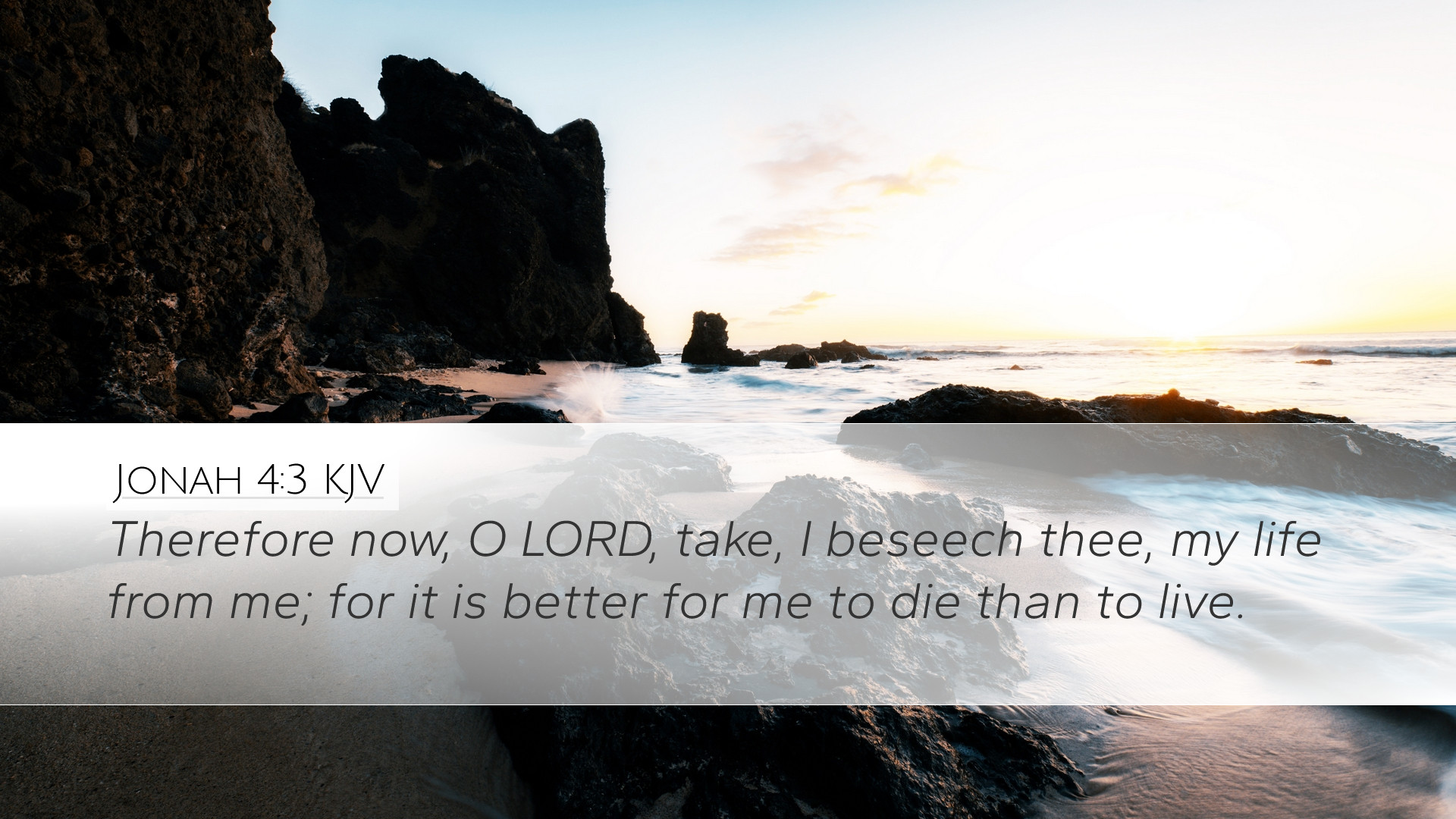Old Testament
Genesis Exodus Leviticus Numbers Deuteronomy Joshua Judges Ruth 1 Samuel 2 Samuel 1 Kings 2 Kings 1 Chronicles 2 Chronicles Ezra Nehemiah Esther Job Psalms Proverbs Ecclesiastes Song of Solomon Isaiah Jeremiah Lamentations Ezekiel Daniel Hosea Joel Amos Obadiah Jonah Micah Nahum Habakkuk Zephaniah Haggai Zechariah MalachiJonah 4:3
Jonah 4:3 KJV
Therefore now, O LORD, take, I beseech thee, my life from me; for it is better for me to die than to live.
Jonah 4:3 Bible Commentary
Commentary on Jonah 4:3
Jonah 4:3 states: "Therefore now, O Lord, take, I beseech thee, my life from me; for it is better for me to die than to live." This verse captures the core of Jonah's emotional turmoil and theological struggle. Below is a summary of insights from various public domain commentaries on this poignant scripture, aimed at pastors, students, theologians, and Bible scholars.
Understanding Jonah's Desperation
Jonah's cry for death reflects a profound sense of despair and disillusionment. As Matthew Henry notes, "Jonah had been sent to preach to Nineveh, and after the city repented, he felt his mission had failed in a sense, leading to his frustration with God's mercy."
- Theological Conflict: Jonah was aware of God's character as one who is merciful and gracious. This realization troubled him deeply when he witnessed Nineveh's repentance; he felt overshadowed by the impending doom he originally prophesied.
- Self-Centered Despair: Albert Barnes suggests that Jonah's request to die reveals a degree of selfishness. Rather than rejoicing in the salvation of others, he wallows in his disappointment.
- Prophetic Integrity: Adam Clarke indicates that Jonah's desire to die was tied to his identity as a prophet. In his eyes, a failed prophecy warranted his own end, revealing the weight and expectations placed upon prophetic roles in the ancient context.
An Insight into Jonah's Character
As we evaluate Jonah's character through this verse, it becomes apparent that his journey is as much about internal conflict as it is about external obedience to God’s command. Henry outlines how Jonah's previous defiance to God's command to go to Nineveh progressed into his current despondence upon witnessing their repentance.
- Imperfect Obedience: Jonah obeyed God but with reluctance, revealing a duality in his character; he adhered to divine command yet lacked the compassion that God desired.
- Desire for Judgment over Mercy: Jonah's reaction demonstrates a desire for God's judgment rather than His mercy, conflicting with the very nature of God that he was called to proclaim.
Exploring the Concept of Life and Death in Jonah's Plea
Jonah's statement, "it is better for me to die than to live," embodies a theological and existential crisis. Both Barnes and Clarke emphasize the gravity of this sentiment in relation to Jonah's mission and the overarching themes of the Book of Jonah.
- Life: A Gift from God: Clarke elaborates on the sanctity of life, asserting that Jonah's desire to forfeit his life reflects a misunderstanding of God’s plan and the purpose of suffering and joy in the believer's journey.
- Death as Escape: Jonah perceives death as an escape from his pain and disappointment, yet it ultimately serves as a rejection of God's will, which is rich in love and mercy.
The Weight of Prophetic Responsibility
Jonah's experience emphasizes the burdens that come with prophetic responsibility. He lived in a culture with strong expectations about prophetic accuracy. Henry notes that prophetic figures were often seen as mediators between God and the people; thus, their mental and emotional states warranted moral and spiritual weight.
- Reluctance to Embrace God’s Plan: Jonah’s struggle indicates a reluctance to embrace God’s plan—highlighting that obedience does not exclude the struggle of understanding God’s mercy towards others.
- The Burden of Being Right: Jonah wrestles not only with his own emotions but also with the perception of his prophetic message. This reflects a common struggle in ministry where the desire for correctness can overshadow grace.
Applications for Modern Believers
Through Jonah's plea, contemporary readers can draw significant applications that are pertinent to pastoral care, counseling, and personal spiritual growth.
- Understanding God's Compassion: Believers are called to embody the heart of God, which longs for the lost—not just to dispense judgment but to extend grace and mercy.
- Facing Disappointment with Grace: When faced with disappointment, it is crucial to reflect on God’s purposes beyond personal struggles, fostering resilience and hope instead of despair.
- Reevaluating Identity in Ministry: Just as Jonah grappled with his role, current leaders and believers are encouraged to seek their identity in Christ rather than in their roles or performance.
Conclusion
Jonah 4:3 serves as a profound reminder of the complexities of human emotion in the face of divine grace. It challenges readers to confront their own perceptions of justice, mercy, and the weight of their prophetic call. Through this exploration of Jonah’s despair, we learn the importance of aligning our understanding and reactions with God’s unchanging character—a character defined by love and compassion, even in the midst of our personal trials and tribulations.


